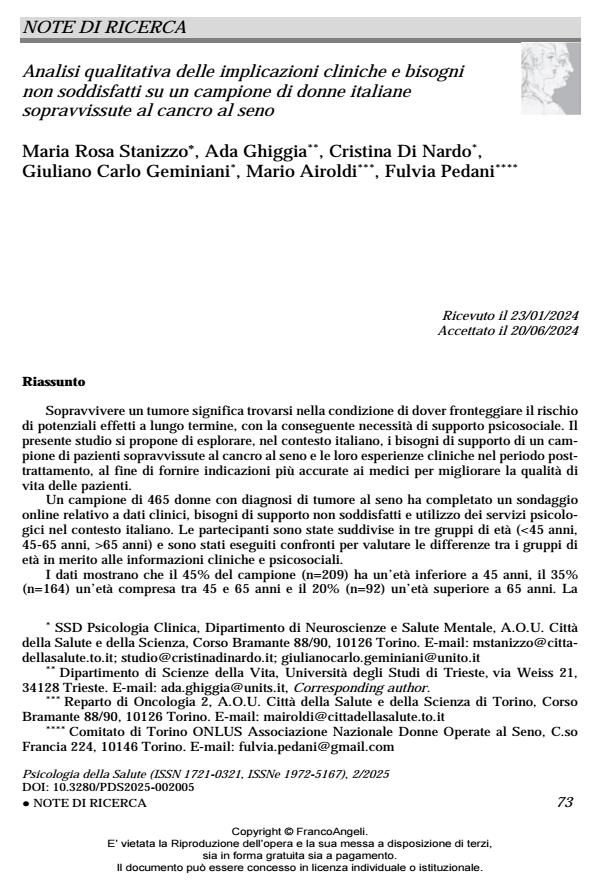Analisi qualitativa delle implicazioni cliniche e bisogni non soddisfatti su un campione di donne italiane sopravvissute al cancro al seno
Titolo Rivista PSICOLOGIA DELLA SALUTE
Autori/Curatori Maria Rosa Stanizzo, Ada Ghiggia, Cristina Di Nardo, Giuliano Carlo Geminiani, Mario Airoldi, Fulvia Pedani
Anno di pubblicazione 2025 Fascicolo 2025/2
Lingua Italiano Numero pagine 12 P. 73-84 Dimensione file 157 KB
DOI 10.3280/PDS2025-002005
Il DOI è il codice a barre della proprietà intellettuale: per saperne di più
clicca qui
Qui sotto puoi vedere in anteprima la prima pagina di questo articolo.
Se questo articolo ti interessa, lo puoi acquistare (e scaricare in formato pdf) seguendo le facili indicazioni per acquistare il download credit. Acquista Download Credits per scaricare questo Articolo in formato PDF

FrancoAngeli è membro della Publishers International Linking Association, Inc (PILA), associazione indipendente e non profit per facilitare (attraverso i servizi tecnologici implementati da CrossRef.org) l’accesso degli studiosi ai contenuti digitali nelle pubblicazioni professionali e scientifiche.
Sopravvivere un tumore significa trovarsi nella condizione di dover fronteggiare il rischio di potenziali effetti a lungo termine, con la conseguente necessità di supporto psicosociale. Il presente studio si propone di esplorare, nel contesto italiano, i bisogni di supporto di un campione di pazienti sopravvissute al cancro al seno e le loro esperienze cliniche nel periodo post-trattamento, al fine di fornire indicazioni più accurate ai medici per migliorare la qualità di vita delle pazienti. Un campione di 465 donne con diagnosi di tumore al seno ha completato un sondaggio online relativo a dati clinici, bisogni di supporto non soddisfatti e utilizzo dei servizi psicologici nel contesto italiano. Le partecipanti sono state suddivise in tre gruppi di età (<45 anni, 45-65 anni, >65 anni) e sono stati eseguiti confronti per valutare le differenze tra i gruppi di età in merito alle informazioni cliniche e psicosociali. I dati mostrano che il 45% del campione (n=209) ha un’età inferiore a 45 anni, il 35% (n=164) un’età compresa tra 45 e 65 anni e il 20% (n=92) un’età superiore a 65 anni. La maggior parte delle partecipanti (59%) è attualmente occupata e il 62% svolge un lavoro che richiede l’interazione con il pubblico. Sono state riscontrate differenze tra i gruppi di età anche per quanto riguarda l’offerta di consulenza psico-oncologica alle partecipanti. Dai dati raccolti, abbiamo rilevato diversi bisogni di supporto non soddisfatti nel panorama italiano. Sensibilizzare il personale ospedaliero sui bisogni psicosociali potrebbe contribuire a identificare i problemi critici e introdurre soluzioni di servizio pubblico per soddisfare tali bisogni.
Parole chiave:bisogni insoddisfatti, tumore al seno, sopravvissuti al cancro, supporto psicosociale, servizi psicologici.
Maria Rosa Stanizzo, Ada Ghiggia, Cristina Di Nardo, Giuliano Carlo Geminiani, Mario Airoldi, Fulvia Pedani, Analisi qualitativa delle implicazioni cliniche e bisogni non soddisfatti su un campione di donne italiane sopravvissute al cancro al seno in "PSICOLOGIA DELLA SALUTE" 2/2025, pp 73-84, DOI: 10.3280/PDS2025-002005